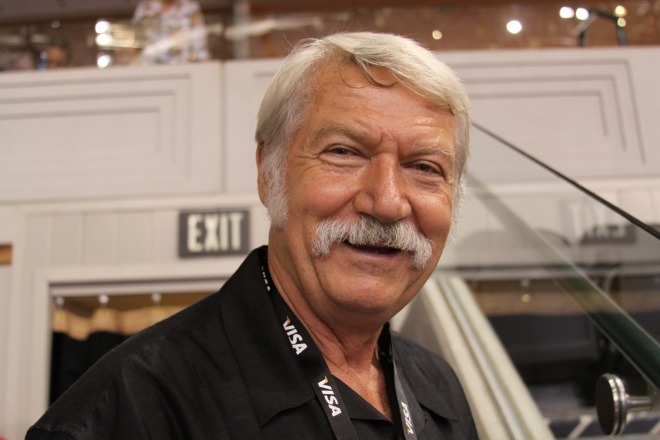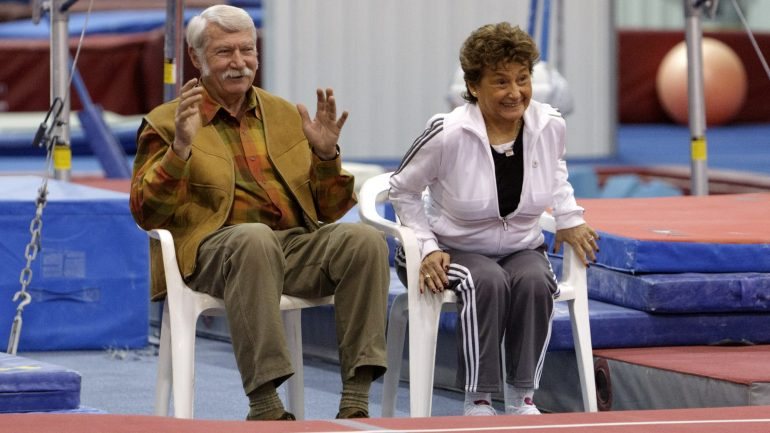


When asked in 2008 to comment on the allegations, Béla Károlyi said: "I ignore it. Other Romanian team members, including Ecaterina Szabo and Rodica Dunca, as well as Géza Pozsár, the Romanian team choreographer who defected with the Károlyis, have made similar charges of physical abuse. "In one word, I can say it was brutal," she told KCRA. In November 2008, Emilia Eberle, a Romanian national team member during the Károlyi coaching era, gave an interview to KCRA-TV in Sacramento, California, claiming that while she was on the team, both Béla and Márta regularly beat her and her teammates for mistakes they made in practice or competition. The Károlyis sold the training facilities at the Karolyi Ranch to USA Gymnastics, however they will continue to own the surrounding land as well as their nearby residence. Valeri Liukin was named as her replacement on 16 September 2016. Her last group of gymnasts called themselves 'Final Five' because that has been Márta's last Olympics ever. She retired from coaching in 2016, after the Olympics where the U.S Women Gymnastics Team won 9 Medals (4 Golds, 3 Silvers, 1 Bronze).

As a result of the review, Raisman was awarded an additional tenth of a point for difficulty, allowing her to win the bronze medal on a tie breaker. The Károlyis' daughter, Andrea, is the nutritionist for the team.Īt the 2012 Olympics, after Aly Raisman was given a score of 14.966 in the balance beam final, which put her a tenth of a point behind Cătălina Ponor of Romania, Károlyi requested a video review. Among her duties are selecting athletes for competitions, determining apparatus lineups at the meets, and making recommendations about skills and routine compositions. It has also yielded impressive competitive results: Between 20, American women have won a combined total of forty-four medals in World Championship and Olympic competition.Īs coordinator, Márta oversees all aspects of the women's national team. While she maintained some aspects of Béla's original program, her approach has been different, and generally more acceptable to the gymnasts and their coaches. national team coaches, the position was handed over to Márta. In 2001, on the recommendation of the U.S. His approach was protested and resisted by both the national-team gymnasts and their coaches, who, by the 2000 Olympics, were so frustrated and unhappy that they spoke about the situation publicly. However, three years later, Béla returned to the public eye when he was named the national team coordinator for the U.S. women's team for the 1996 Olympics.Īfter the 1996 Olympics, the Károlyis retired from coaching. In 1996, Márta was chosen as the head coach of the U.S. Béla accompanied the gymnasts to meets and was a highly visible presence to both the gymnastics community and the media Márta remained in the background. In the Károlyi coaching team, Béla was often known as the "motivator," while Márta was the "technician," applying her gymnastics savvy to help her athletes learn and perfect their technique, mechanics, and form.

Márta Károlyi has avoided most of the controversy and accusations of abusive coaching that have trailed her husband, opting for a quieter, less abrasive approach. By 1990, Károlyi gymnasts were so dominant at national United States meets that journalists dubbed the top cluster of athletes the "Károlyi six-pack." At the 1991 World Championships, every single gymnast on the American squad was either a Károlyi athlete or trained by a former Károlyi club coach. Béla's status as "Nadia's coach" quickly attracted gymnasts to the club, and by the late 1980s, the Károlyi gym had become the preeminent training facility in the United States. After their defection, the Károlyis established a gym in Houston, Texas.


 0 kommentar(er)
0 kommentar(er)
